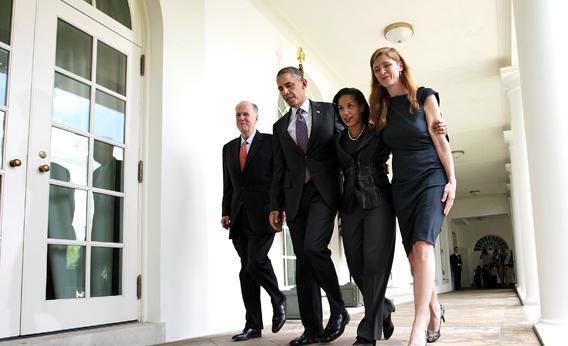If Samantha Power is successfully installed as Susan Rice’s successor as U.N. ambassador following Rice’s ascension as national security adviser, something remarkable will have happened: All four of the main national security and foreign policy jobs in the Obama administration will be in the hands of people who supported Obama’s election to the presidency.
That sounds banal. But it hasn’t always been the case. In fact, some years ago I heard a curious story about a potential low-level political appointee at the State Department who needed a favor from a Democratic Party bigwig. The problem with the potential appointee was political, not substantive. You see, he’d been an Obama supporter from the early going. In other times or in other administrations that might have been an asset. But in a State Department headed by Hillary Clinton and staffed by her political loyalists, premature Obama support was a liability. Things got smoothed over, and naturally over the years tensions between Obama and Hillary supporters greatly muted. Still, for much of the first term there was a striking absence of Obama people in the national security apparatus.
The financial collapse of 2008 and the horrendous recession of 2009 have tended to obscure the fact that Obama’s presidential campaign was initially very heavily focused on foreign policy issues.
There were few substantive disagreements between Obama and Clinton in the 2008 primaries, but there was a big gap in their Iraq records. Clinton—joined by most of the Democratic foreign policy establishment—had backed the resolution authorizing the use of force in Iraq sought by George W. Bush. Obama, at the time a state senator with a liberal district in Chicago, spoke out against the war. He was joined in his campaign by many younger Democratic staffers who were energized by the war issue. Of that group, probably the most senior was Rice, an assistant secretary of state in the Clinton administration who’d also backed Howard Dean’s anti-war insurgency in 2008. The most high-profile was Power, a celebrated author and journalist. And the dispute between the camps—both visibly between the candidates and behind the scenes on a staffer-to-staffer level—was quite vehement, with many Obama supporters warned that their careers would be ruined when their man lost.
Except he didn’t lose. The problem was that by the time he took office, other things were more pressing than pursuing old intra-party feuds.
Getting Clinton out of the Senate and into the administration was smart strategy. But that meant a high-profile prestige gig like secretary of state, rather than something low-profile like Health and Human Services where there was no legacy of disagreement. The simultaneous decision to retain George W. Bush’s defense secretary, the old-line realist Robert Gates, to offer a patina of bipartisan cover for withdrawal from Iraq was also smart. But Gates, like Clinton, asked for and received the right to name his own subordinates.
Then Obama picked the apolitical former Gen. James Jones as national security adviser. Again, this was a move with some real logic behind it. Jones’ presence lent credibility to a young and untested commander in chief with the military establishment.
But in combination with the other two choices—and paired with the fact that like all new presidents, Obama inherited his predecessors’ choices of which admirals and generals held the various four-star roles—it created a dearth of Obama supporters in the Obama administration. Instead of Cabinet secretaries with their long staff tails, there was Rice at the United Nations and a small number of influential National Security Council staffers—Denis McDonough, Power, Tommy Vietor, Ben Rhodes—with relationships with the president. And so it largely remained even as Gates and Jones were replaced by Leon Panetta and Tom Donilon, both veteran Democrats with no particular ties to Obama.
Now things are different. With McDonough as chief of staff, two senators with close personal relationships with Obama running the departments of state and defense, Rice as national security adviser, and Power prepared to accept a senior public facing role we’re looking at the team that Obama probably would have wanted all along absent other considerations.
What that means exactly for policy is difficult to say. The principals involved have a range of perspectives, as is customary and healthy in a team. But it’s reasonably likely to make some kind of difference. Structural factors typically drive second-term presidents to more personal engagement with national security questions. And if Obama does want to throw himself in a big way into a national security issue—whether that’s an intervention in Syria, a renewed push for a deal between Israel and Palestine, or something elsewhere—he now has the team in place to do it.
